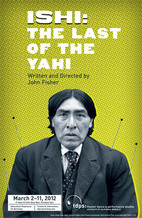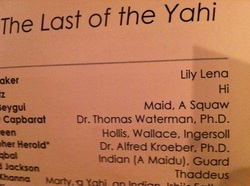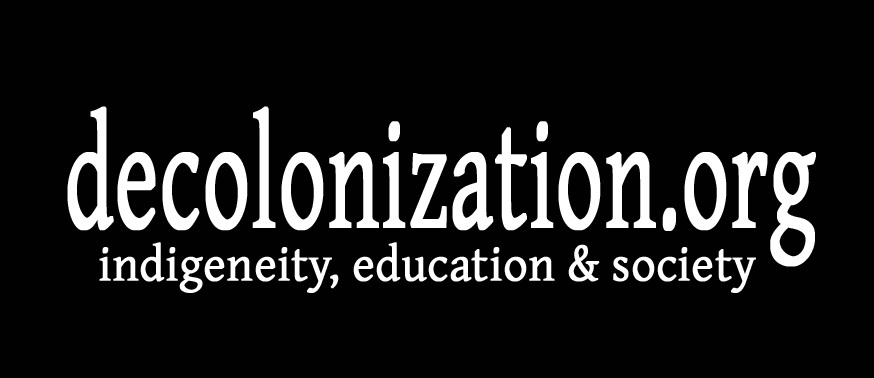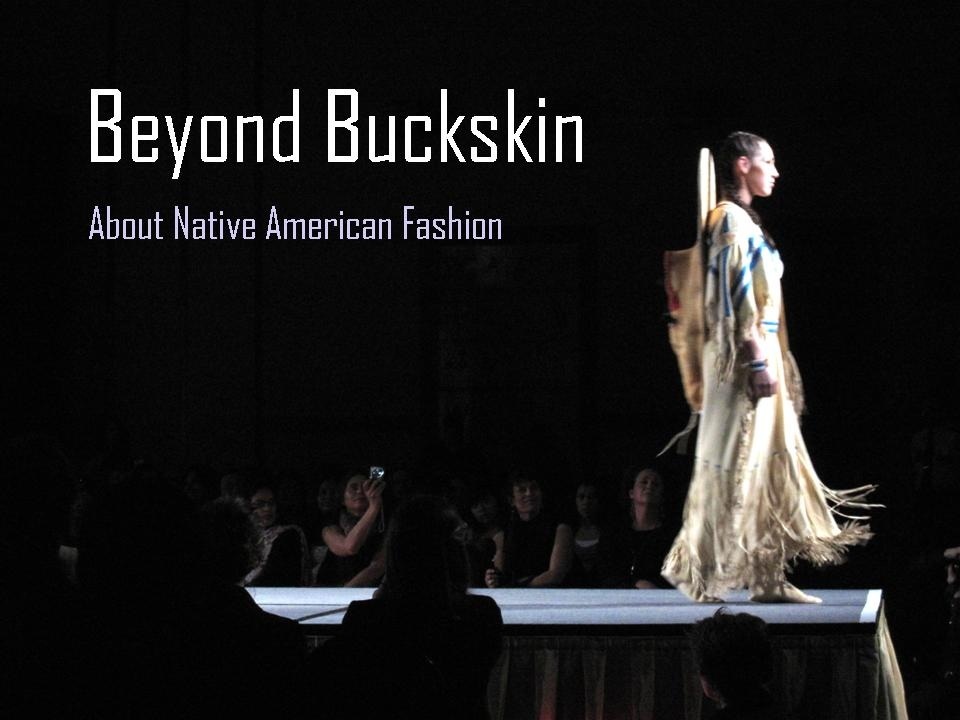I went to see "Ishi: Last of the Yahi" at UC Berkeley and all I got was this blog entry. (Review)3/11/2012  Ishi: the Last of the Yahi is currently being performed at the Zellerbach Playhouse on the UC Berkeley campus and runs through today (March 11). I attended the play as a guest of my cousin, Kayla Carpenter, who is attending UC Berkeley as a graduate student in Linguistics. We are both Northern California Native peoples. I am enrolled in the Hoopa Valley Tribe with ties to the Karuk and Yurok peoples. I am also a PhD Student in Native American Studies at UC Davis where I focus on Native American Literature, Native American Women, California Indian History and Contemporary Society, Indigenous Politics and Contemporary Society, Indigenous Methodologies and the Decolonization of Theory. The play was originally introduced to me by another UC Berkeley Graduate Student, Tria Andrews who offered a review after she was required to attend the production for class. I recommend reading it. I offer this response to my experience attending this play as a way of continuing the conversation "in a good way." Thank You. First let me tell you about the point where I almost walked out. Ishi, having been living in the Museum of Anthropology at UC Berkeley for a few years was finally brought back to his home (Deer Creek) by Alfred Kroeber, his junior faculty Thomas Waterman and Dr. Saxton Pope (who will eventually be the person that betrays Ishi's wishes and dissects his body and harvests his brain to send to the Smithsonian). At Deer Creek a number of "hilarious" things happen, Kroeber admits that he doesn't really like nature all that much (and misses his wife), all the European American characters get together and sing cute little songs like "She'll be comin' round the mountain when she comes (yee haw)" and Dr. Saxton Pope (of the brain harvesting popes) "goes Native" where she dresses in a two piece buckskin outfit (am I to assume she bought these from a street vendor in Berkeley before she left? Or perhaps at Forever 21 or Urban Outfitters?) and simulates giving birth while whooping, hollering and standing up. She also tears the umbilical cord with her teeth, as a real Native woman would do. It's meant to be tongue in cheek, I get it. These crazy European American scholars, tee hee, ha ha. In the mean time, they want to continue to pressure Ishi to tell his story. His story will make them a lot of money, you see, and "build them a museum." When Ishi finally does tell his story it rests with the fate of his sister. You see Ishi and his sister had been in an incestuous relationship for a while now but then she was "raped" by a white man. However, when Ishi points this out to her she desperately clings to him and says "First I was unwilling, now I am willing. This makes it alright." It was at this point I started gathering up my things. I couldn't take it any more. First Ishi is just "a man" and then he is a man who has sex with his sister and then he is a man who kills his incestuous baby by drowning it in a creek because they are trying to get away from being hunted by the "colonizers" of California. And then he is a man cuckholded by his own sister who has to let her go or otherwise she may say things that he doesn't want to hear and "If she said it, I knew I would beat her, I was almost beating her now." Later Ishi helps to kill her half breed baby, because the sister believes this will mean she can be with her man. Why Ishi helps her is a little unclear. Why he sends her to her death is also a little unclear. Anyway you cut it Ishi's sister doesn't have a name, she's just called "Woman" and in the end her last line is "Good. Dead. Dead for you." I eerily felt like she was speaking to the playwright himself. There's been a fair amount of controversy over the staging of this play Ishi: The Last of the Yahi written and directed by John Fisher for the UC Berkeley Department of Theater, Dance & Performance Studies. You can read a beautiful and poignant review and initial reaction by UC Berkeley Graduate Student Tria Andrews here. Faced with watching this play for class, Tria wrote this review as an immediate response to the careless, horrific portrayal not just of Ishi but also of Native people in general in this play. It was because of that review that I attended the play along with other students and Native peoples who wanted the opportunity to "talk back" to the staff after the show was completed. As a result of the hard work of the American Indian Graduate Student Association at UC Berkeley there were two inserts added to the program, the first being a "response" quote from Director/Writer John Fisher and the second being a statement about Ishi written by the Native American students. John Fisher's statement is as follows: As I state in my "Authors Note," Ishi is a work of fiction based on fact. I have combined research with creative writing to make the point that the California Holocaust was a horrific event; its perpetrators ruthless and sadistic. There is much we do not know about Ishi's life before he came out of the woods, and I have tried here to depict how terrifying that life might have been and how egregious life during any genocide must be for the victims. For a factual account of Ishi's life and the harrowing aspects of his genocide, as well as Ishi's subsequent exploitation by men like Kroeber, I recommend most highly Orin Starn's "Ishi's Brain". The students, on the other hand provided a touching quote from Ishi himself, effectively giving Ishi the voice that he is denied throughout the play. When I am dead, cry for me a little. Think of me sometimes, but not too much. It is not good for your wife or your husband or your children to dwell too long on the dead. Think of me now and again as I was in life, at some moment which is pleasant to recall, but not for long. Leave me in peace as I shall leave you, too, in peace. While you live, let your thoughts be with the living. A poetic and beautiful statement which clearly illustrates that Ishi was an intelligent and insightful human being. Throughout this play he often speaks in broken, short, "Indian" speak such as "No, you stay. I go." (this is in fact his last line) or "One good thing, no more therapy. No more questions. I do my rounds." In fact, at the end of the play where "Ishi" finally gets to make his eloquent speech about the perils of manifest destiny and the trappings of "survival" it is not Ishi who makes this statement it is (as written in the script) the actor "dropping character, rising and speaking as the ACTOR who plays the role." Nowhere do we get Ishi's voice in this play, at no time is Ishi given the real opportunity to show that he is much more than "a blank slate waiting to be named and reinscribed" or that "So much was taken away by the time he came to us that we wasn’t a Yahi man with a Yahi name anymore, he was a no one." This is the "ACTOR" speaking as himself at this point, lecturing the audience, reminding the audience and anyone they pass this information along to that by the time these Native peoples were coming out of the woods they were utterly destroyed. They were falling apart (granted at the hands of the genocide going around them) but, you know, "manifest destiny was a two way street" and it was a degenerate time, where all people were driven to degeneracy. Especially those, as Dr. Saxton Pope states about Ishi's sister who "had no cosmology, no morality, so she created her own." The implication here being that Ishi and his sister were denied their cosmologies because their father was killed when they were so young. Left as "wild children" they raised themselves so they naturally degenerated into an incestuous relationship that resulted in violence and ultimately the death of the sister as a result of her ignorance, and the death of "Ishi" or his "true name" as after this he decides to leave the woods to "die." I am floored. Ishi was a person. I want people to consider the legacy that Ishi tried to leave. He told stories, old stories, from his tribal peoples. He wanted their "cosmologies" to be acknowledged. He was 49 years old when he "came out of the woods" and he was well aware of the society around him. His camp included pots and pans and tents. He was also, to be frank, not the last of his tribe. The fiction created by Kroeber, created by Berkeley, created here by John Fisher, is the continued exploitation of a real person who lived the last five years of his life in a museum. Fisher is not more innocent because he also portrays Kroeber as an arrogant, flawed, self centered man. He is not more innocent because he "knows" about the "genocide" of Native peoples in California and wants to use his "art" to shock people into "having a conversation." He is not more innocent because he hides behind historical fiction and calls it "based on fact." At the end of the play, having been subjected to the killing, fileting, burning, raping and molesting of Native peoples all over the stage. After having watched Native characters being "hunted" and chased around the theater, sometimes set to "cartoon" music. After having watched as Ishi drowned his child, beat and "raped" his sister, and was beaten by his own father -- I was exhausted. My stomach had a huge knot in the center. My neck was stiff. I listened to the tears falling from other Native peoples in the audience around me. I watched as my cousin clenched her hands tightly together and waited. The lights went up, people applauded, but I and several others around me did not. I waited anxiously for the "talk back" and wondered what others in the audience would say. My cousin relayed to me that one man had walked up to her at intermission and told her that he had done work with the Hupa people before and that he was leaving the play in disgust. I had watched after intermission as the audience grew smaller on both sides. I didn't prepare any questions or statements but wanted to wait to see what others had to say. After a statement by the Department at Berkeley, my cousin was given the opportunity to speak. She offered a prayer. And while I do not plan to transcribe the entire prayer I thought it was a beautiful illustration of the cosmology and ontology of Native peoples, especially those of California. This society (still alive, still vibrant FYI) had within it concepts of "growing old in a good way" and had a deep knowledge of the universe that while scarcely approached in scholarship and research holds within it answers to some of the deepest questions of Western knowledge. Ishi's language was no different. And this insistence at portraying him with "Indian" speak, or broken English only further shows the ignorance of this play. When the Writer/ Director finally spoke it was in response to a question from the audience. "Exactly how much of the story was based on fact would you say?" Fisher's response was this: In sort of framing my participation tonight I think this is a work of art and the attempt to defend it of necessity must collapse on itself. I had very clear motives in creating it four years ago. It is now in its second incarnation and to talk about specifically what is story and what is fact I think is to attempt to explain it. And I can't really speak to explaining it, to defending it. I feel unprepared to answer that question. From the audience I heard someone mutter "what?" And I felt the same way. We had stayed because of the "opening of dialogue" and "breaking ground for conversation about sensitive issues" (all statements made at the start of the talk back) and now we were told that there would be no effort to "explain" this "work of art." The talk back continued with people speaking about the effort to "create dialogue" by the play and "calling attention to these issues." After one audience member asked for a response from the American Indian students about why they didn't like the play a Native man stood up and took the microphone. He couldn't finish his statement and it ended in tears. It was a meaningful illustration of what this play really does, it doesn't open dialogue, it glorifies trauma. It erases the real, living Native peoples (some of whom are Ishi's relatives). It forgets that those people could be sitting in the audience. It refuses to dialogue with them when they ask real questions, how can you justify portraying Ishi and his story in this way? Why do you use this opportunity to give him a voice to destroy that voice? Why must you "confront" us with these images of the holocaust and genocide but also include a pseudo-justification for it by allowing that "even the Natives were participating in these atrocities - against each other?" Why would you take a peaceful, intelligent man and belittle his story to a sensationalist, animalistic portrayal? Why will you not acknowledge that your "art" could have been better? And now that you have access to Native people who want to have a dialogue with you and offer real feedback so that you can learn something and also teach others why won't you actually talk to them? But I didn't say any of those things. Caleen Sisk offered a response as the Chief of the Winnemem Wintu Tribe of California. She had traveled from Northern California to see the play for herself. Her tribe are relatives to Ishi's tribe. And after she was finished and another man spoke (who was slightly disturbed himself at the portrayal of Ishi) I took the microphone. I offer my entire statement here for you to read. I spoke without writing anything down and from the heart. I did not expect to be so personally affected by what I was seeing on stage. I did want to take the opportunity to tell everybody here and all of the people in the play that I don't want you to leave thinking that Ishi is a rapist, that he had sex with his sister, that he killed a baby- that he was a part of it. I want you to go out and find out about him. He was a gentle, peaceful person and he gave of himself personally to keep the dialogue going. And for that to be what anybody walks out of this place with- it's a tragedy, because we fight every single day to be heard and I don't want you to just hear that. And I think there is a real opportunity here for everybody involved to take a step back and understand that you can change this. And I know that it feels very personal, I myself am a writer, and if somebody were to come tell me to change something that I made it would be like changing one of my children, but this is different. You don't get to hide behind historical fiction; it doesn't work that way. Not when you have a people who are based in what Kayla was talking about- to grow old in a good way, to be whole and balanced. If you leave here tonight with one thing repeat to yourself- that was not Ishi, that he deserves more, he deserves a real voice and take it upon yourselves to figure out how you are going to find that voice for him or you will have done him a great injustice again. There will be a followup "dialogue" on Tuesday at 4pm in the Durham Studio Theatre in Berkeley. I have also heard that people have gone to sit outside the play to sing and call attention to the lies about Ishi. The last night of the performance is tonight. The images -- they will stay with me -- but I will let only the good things in and none of the bad. Ts'ehdiya.  Here is the picture I took of the program for the play. Notice the third character(s) down are listed as "Maid, A Squaw"... And then even further down you have "Indian (A Maidu)". So while the male Indian gets at least some tribal affiliation (and that's not to say even this is the best designation for these characters) - the Native Woman who is raped and killed after she first appears is simply known as "A Squaw." I write more about this in the comments below. To keep people updated as things happen I am adding on the following part to this review: Here is the article where the Theater Department at Berkeley apologizes for staging the play. Here is an article written for The Daily Cal by the Native Graduate Students about art and ethics and the play. Here is a blog entry by a Professor at Berkeley which talks about what happened at the teach in with students and Professors.
12 Comments
Marlette Grant
3/11/2012 08:14:32 am
Very Good Cutcha, I wish there was more we could do... you, Kayla and Caleen did a good job of representing all of us! I can just hope that John Fisher and the likes can learn something from this as to not do it again!
Reply
Scott Wallin
3/11/2012 11:03:37 am
Dear Ms. Risling Baldy,
Reply
Stephanie Lumsden
3/11/2012 11:13:57 am
I'm not sure Mr. Fisher deserves the thought that you have put into this response, but I know that Ishi does, and I'm sure he's made glad by it.
Reply
Kathy Wallace
3/11/2012 11:20:31 am
Thank you Cutcha! I remember going through a similar experience at a premier of a movie about Ishi, years ago. I was in tears and was about to leave when I was put on the spot. Since several of the hosts knew I was the only Native American at this event, they thought it would be a great idea to get my input. I was at a loss for words. It was so wrong and I did not think that my comments would make any difference to the film makers or the audience. I decline to comment. It was too painful.
Reply
Anonymous Audience Member
3/11/2012 06:30:58 pm
This play is extremely problematic, and I understand how offensive certain aspects of it are. I do not in any way deny that. I do not, however, believe that this play was intending to justify the Native American genocide.
Reply
Cutcha Risling Baldy
3/12/2012 03:56:20 am
Comment 1 of 2 (cause I figured out it was too long! Thanks!)
Reply
Cutcha Risling Baldy
3/12/2012 03:58:09 am
As far as your question: “I wonder, wouldn't it have been equally as awful to NOT depict the violence? Would not showing it be somehow a way of acting as though it never happened?” I think this is where dialogue and discussion and consultation could have come in handy for those who were in the audience and also for those in the play (and the playwright himself). There will be many answers to this question by many different people. And I do see the point in that we don’t want to erase that historical violence from the narrative. However, the violence in this play was surrounded by the violence performed by Ishi and other Native characters. And this is where I call foul. This is how, subconsciously, the play justifies the violence against Native peoples. It insists that they too were driven to horrific violence. And while I will say that the violence throughout California during this time was varied and that some Native communities did participate in the act of fighting for their lives, I cannot condone this portrayal of Ishi who was known for his nonviolence. I also, as I mentioned above, cannot condone the non-naming of Native characters, the treatment of them as props to “demonstrate” the violence of this time.
Andrew F
3/13/2012 07:22:09 am
I found nothing salvagable in this play. Tempted to walk out at intermission, we regretted staying till the end, nonetheless.
Reply
Ski
3/14/2012 05:33:30 am
I am an actor based in Chicago, and my sister sent me in the direction of this (and other) reviews of the play. She wanted to know my perspective, as a theatre artist. This is the comment I posted to her, and I wanted to share it here:
Reply
Theatre veteran
3/28/2012 12:08:10 pm
As a thirty year veteran of hundreds of productions and someone who knows a bit of the inside story I though I would add a few comments.
Reply
Kayla Carpenter
4/19/2012 06:34:26 pm
[Ishi: What happened before was rape, he raped you.
Reply
Theater veteran
4/25/2012 08:01:36 am
Well you see as you mentioned it "Is a Play". It is a work of fiction. Now it may be your stance that everything presented on canvas and the stage and on film MUST be totally factual and be checked and have anything that might offend any person removed. I wouldn't want to live in that environment. There are people offended if you mention Jesus and those if you don't. I have met people that are offended by certain colors.
Reply
Your comment will be posted after it is approved.
Leave a Reply. |
SubscribeClick to
AuthorCutcha Risling Baldy is an Associate Professor and Department Chair of Native American Studies at Humboldt State University. She received her PhD in Native American Studies from the University of California, Davis. She is also a writer, mother, volunteer Executive Director for the Native Women's Collective and is currently re-watching My Name is Earl... (5) Top PostsOn telling Native people to just "get over it" or why I teach about the Walking Dead in my Native Studies classes... *Spoiler Alert!*
Hokay -- In which I lead a presentation on what happens when you Google "Native American Women" and critically analyze the images or "Hupas be like dang where'd you get that dentalium cape girl? Showing off all your money! PS: Suck it Victorias Secret"
In which we establish that there was a genocide against Native Americans, yes there was, it was genocide, yes or this is why I teach Native Studies part 3 million
5 Reasons I Wear "Indian" Jewelry or Hupas...we been bling-blingin' since Year 1
Pope Francis decides to make Father Junipero Serra a saint or In Which I Tell Pope Francis he needs to take a Native Studies class like stat
I need to read more Native blogs!A few that I read...
Archives
June 2020
Categories
All
|






 RSS Feed
RSS Feed
